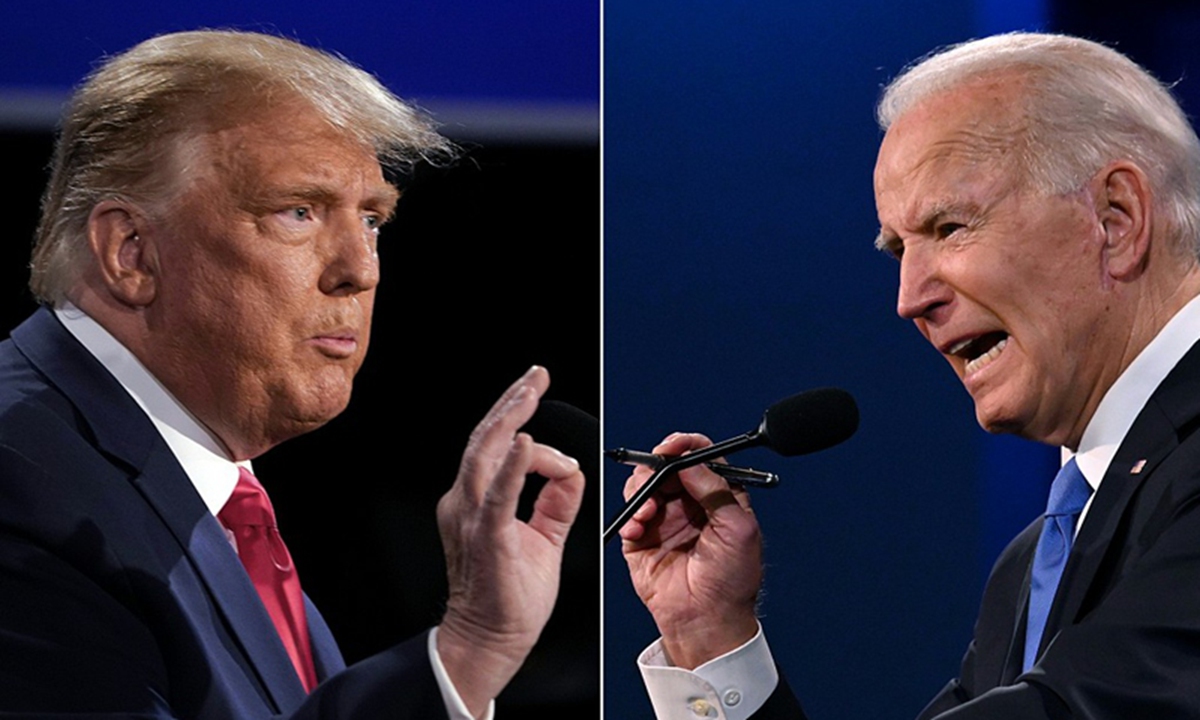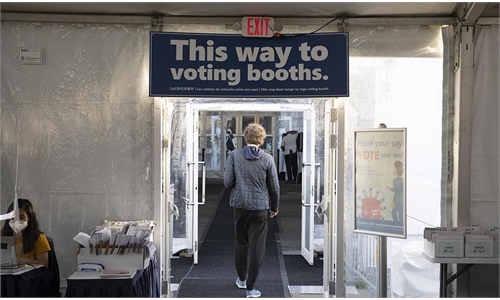
Photo: VCG
Judging from the votes counted so far, US voters are almost evenly split between incumbent President Donald Trump and Democratic presidential nominee Joe Biden, with the latter pulling ahead by a narrow margin.As of Friday, Biden has amassed over 74 million votes, while Trump has received nearly 70 million - already the most and second-most in the history of the US, according to media reports. This signals that US society has been deeply divided. Extreme disapproval of each other's notions and stances has prompted extreme mobilization by both parties, urging a great number of US citizens to proactively participate in voting.
The highly political division in the US will pose a considerable challenge to the new government. The significant number of votes that Trump received showed the US has a large base of conservative voters.
They will to a large extent contain the next government in making and implementing its policies on internal and foreign affairs if Biden becomes the next US president.
Biden is a moderate Democrat and harbors the will to mend the social division. If assuming office, he is expected to deliver a speech, committing to the public that he will unify the public. However, as a matter of fact, US social division is difficult to fix, especially on some sensitive domestic issues, such as health care, gun sales, and abortion. Biden will encounter a tough situation. Within the Democratic party, far left such as Bernie Sanders and Elizabeth Warren, will pile pressure on Biden to carry out policies consistent with the interests of Democrats. However, nearly half of Americans supporting the Republicans will disapprove of their left-wing moves, which will restrain the implementation of their policies. Furthermore, as Biden is 77 years old, it is doubtful whether he has sufficient energy and capability to bridge the divide.
Over the past four years, Trump has applied diverse political notions and governance patterns, including white supremacy, populism, inflammatory rhetoric, hyping protectionism, and showing no respect for science. These have contributed to the notion of Trumpism. The large number of votes for Trump reflects Trumpism enjoys a huge base of followers in the US.
Even if Trump fails to be reelected, Trump's prior moves will subtly affect the US in the future. For example, Trump has appointed three Supreme Court justices, swinging the country's highest court to a conservative 6-3 majority. This will play a big role in pushing US' conservative agenda and contain the potential Biden administration.
Trump's practices are deeply imprinted on not only internal affairs but also diplomacy. It is unlikely the new administration can abandon all of diplomatic practices of the Trump administration if Biden wins. However, the "America first" policy and Trump's narratives and moves toward China have gravely undermined the interests of both the US and its allies. US' strategic mutual trust with other countries, especially its allies, has been severely impaired. This will create a big obstacle for the potential Biden administration to strengthen the US alliance system and global leadership.
In terms of foreign policy, some traditional approaches of the Democratic party include emphasizing multilateral cooperation, solidifying US leadership and participating in global governance. In terms of China policy, it is possible that dialogue with China will be increased and China-US bilateral tensions will ease to some extent. But the Democrats will inevitably encounter resistance from conservatives.
However, no matter who wins eventually, in general, both parties are on the same page on how to deal with China. They both label China as their strategic rival and aim to contain China, but with diverse means and tactics.
In the short run, China's relations with the US will be less tense. But in the long-term, the bilateral ties will face bigger challenge as Biden underlines US leadership, and he will spare no effort to align with its allies and partners to check and balance China, which seems to be more threatening to China in comparison to Trump administration.
The author is Deputy Director and senior fellow of the Institute of American Studies, Chinese Academy of Social Sciences. opinion@globaltimes.com.cn


